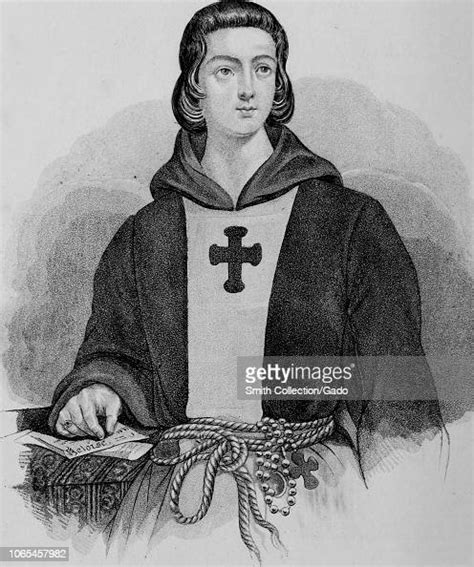A Quote by Blaise Pascal
When a natural discourse paints a passion or an effect, one feels within oneself the truth of what one reads, which was there before, although one did not know it. Hence one is inclined to love him who makes us feel it, for he has not shown us his own riches, but ours. ...such community of intellect that we have with him necessarily inclines the heart to love.
Related Quotes
Though we are many, each of us is achingly alone, piercingly alone. Only when we confess our confusion can we remember that he was a gift to us and we did have him. He came to us from the creator, trailing creativity in abundance. Despite the anguish, his life was sheathed in mother love, family love, and survived and did more than that. He thrived with passion and compassion, humor and style. We had him whether we know who he was or did not know, he was ours and we were his.
This may sound like heresy, but it is the greatest truth! It is more difficult to let God love us, than to love Him! The best way to love Him in return is to open our hearts and let Him love us. Let Him draw close to us and feel Him close to us. This is really very difficult: letting ourselves be loved by Him. And that is perhaps what we need to ask today in the Mass: 'Lord, I want to love You, but teach me the difficult science, the difficult habit of letting myself be loved by You, to feel You close and feel Your tenderness ! May the Lord give us this grace.
Our redemption through the suffering of Christ is that deeper love within us which not only frees us from slavery to sin, but also secures for us the true liberty of the children of God, in order that we might do all things out of love rather than out of fear - love for him that has shown us such grace that no greater can be found.
Whenever we think of Christ, we should recall the love that led Him to bestow on us so many graces and favors, and also the great love God showed in giving us in Christ a pledge of His love; for love calls for love in return. Let us strive to keep this always before our eyes and to rouse ourselves to love Him.
A penniless man who has no ties to bind him is master of himself at any rate, but a luckless wretch who is in love no longer belongs to himself, and may not take his own life. Love makes us almost sacred in our own eyes; it is the life of another that we revere within us; then and so begins for us the cruelest trouble of all.
When you want to direct someone toward the good, first put him at peace bodily and honor him with words of love. For nothing inclines such a man to shame and induces him to cast of his vice and be changed for the better as do bodily goods and honor, which he sees in you. Then, with love tell him a word or two, and do not be inflamed with anger toward him. Do not let him see any cause of enmity toward you. For love does not know how to lose its temper.
God is a fire that warms and kindles the heart and inward parts. Hence, if we feel in our hearts the cold which comes from the devil - for the devil is cold - let us call on the Lord. He will come to warm our hearts with perfect love, not only for Him but also for our neighbor, and the cold of him who hates the good will flee before the heat of His countenance.
That part of Christ's nature which was profoundly human helps us to understand him and love him and to pursue his Passion as though it were our own. If he had not within him this warm human element, he would never be able to touch our hearts with such assurance and tenderness; he would not be able to become a model for our lives.
The analytical writer observes the reader as he is; accordingly, he makes his calculation, sets his machine to make the appropriate effect on him. The synthetic writer constructs and creates his own reader; he does not imagine him as resting and dead, but lively and advancing toward him. He makes that which he had invented gradually take shape before the reader's eyes, or he tempts him to do the inventing for himself. He does not want to make a particular effect on him, but rather enters into a solemn relationship of innermost symphilosophy or sympoetry.
A man who is wrathful with us is a sick man; we must apply a plaster to his heart - love; we must treat him kindly, speak to him gently, lovingly. And if there is not deeply-rooted malice against us within him, but only a temporary fit of anger, you will see how his heart, or his malice, will melt away through your kindness and love - how good will conquer evil. A Christian must always be kind, gracious, and wise in order to conquer evil by good.
By a beautiful paradox of Divine love, God makes His Cross the very means of our salvation and our life. We have slain Him; we have nailed Him there and crucified Him; but the Love in His eternal heart could not be extinguished. He willed to give us the very life we slew; to give us the very Food we destroyed; to nourish us with the very Bread we buried, and the very Blood we poured forth. He made our very crime into a happy fault; He turned a Crucifixion into a Redemption; a Consecration into a Communion; a death into Life Everlasting
Before His gaze all falsehood melts away. This encounter with Him, as it burns us, transforms and frees us, allowing us to become truly ourselves... His gaze, the touch of His heart heals us through an undeniably painful transformation "as through fire". But it is a blessed pain, in which the holy power of His love sears through us like a flame, enabling us to become totally ourselves and thus totally of God.
Honesty is not the same as truth. That is the obstacle of the notion of relative truths. I would like to put my trust in the lunatic. He is the one least concerned of what I think of him, the mark of an honest man. I can always depend on him to be completely honest in what he thinks and feels, about anything, no matter the consequences laid before him, however with no course of rationale, I cannot necessarily take his word for even the well-being of him in his own reality.









































